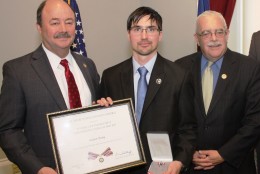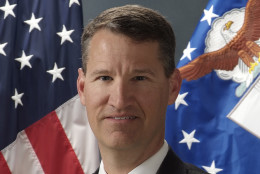Defense
-
There's failure and then there's failure. Big and small. One way to prevent the big ones is to develop tolerance for the small ones along the way. That's in part the idea behind a Pentagon drive to get more commercial innovation into its so-called third offset strategy. For what this means to contractors, Larry Allen, principal at Allen Federal Business Partners spoke to Federal Drive with Tom Temin about the topic.
February 05, 2016 -
For many agencies, the move to cloud computing services is predicated by policy, legal and contracting decisions made by more than just the chief information officer.
February 05, 2016 -
Defense experts warned Congress about creeping operating and support costs and suggested ways to rectify them.
February 03, 2016 -
Deputy U.S. Marshal Andrew Wong received a Congressional Badge of Bravery Tuesday from Rep. Gerry Connolly (D-Va.).
February 03, 2016 -
The military services have been dithering with Congress over if and where to reduce their real estate footprint. But there is one spot in the world where the Army is undergoing a major expansion in real estate. Camp Humphries, South Korea is undergoing a multi-billion dollar makeover. Katherine Hammack, the Army assistant secretary for installations, energy and environment, joins Federal Drive with Tom Temin with details of what's going on and why.
February 03, 2016 -
Defense Secretary Ash Carter says the Obama administration's final Pentagon budget represents a turning point; high-end technologies will get more attention.
February 03, 2016 -
Fiscal 2017 may be the beginning of a funding gap between what the Defense Department needs and what it can be allocated unless Congress can fix the budget.
February 02, 2016 -
Last year, Google invested $100 million in Crowdstrike, a cybersecurity company. The Defense Department has also turned to Crowdstrike as part of its third offset strategy. Just who is this outfit? Federal News Radio’s Scott Maucione talked with Robert Johnston, a principal consultant at Crowdstrike, about where the U.S. is in cybersecurity and what he thinks it can expect. He shared that information on Federal Drive with Tom Temin.
February 02, 2016 -
The Defense Department has been trying for years to find a personnel system that's effective for the vast variety of civilians it employs. Some have been tried and discarded. People notice. Some write about it. Rob Albritton worked both in uniform and as a civilian for the Air Force. Federal Drive with Tom Temin asked him about his War on the Rocks blog posting, with four suggestions for the personnel system and whether the system is broken.
February 02, 2016 -
The Pentagon's operational testing and evaluation office says "red teams" are spread too thin to test DoD networks against real-world threats.
February 02, 2016 -
A study by researchers at Johns Hopkins University found that those injured before 2007 during the Afghanistan and Iraq wars are most at risk for chronic problems from traumatic brain injury.
February 01, 2016 -
The Air Force was an early adopter of a online concept: A self-service personnel portal for its service members. But that system, called MyPers, was getting a little long in tooth. It's been undergoing a thorough update. Air Force CIO Bill Marion told Federal Drive with Tom Temin why the system is so important and what's they're doing.
February 01, 2016 -
The National Security Agency has retained almost 97 percent of its employees in 2015.
February 01, 2016 -
NSA's Debora Plunkett has retired after 31 years in government, working in cybersecurity and diversity.
February 01, 2016 -
Sen. Mark Warner (D-Va.) wants to know why the Navy has allowed its top intelligence officer to stay on the job for more than two years while his security clearance has been suspended.
February 01, 2016















